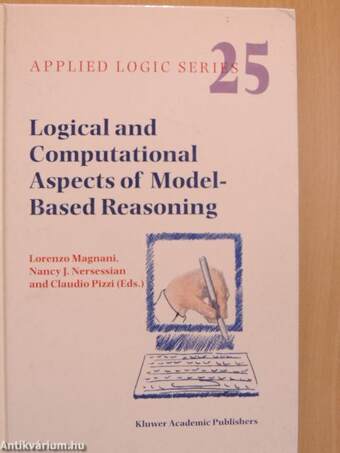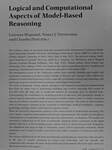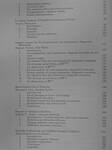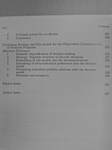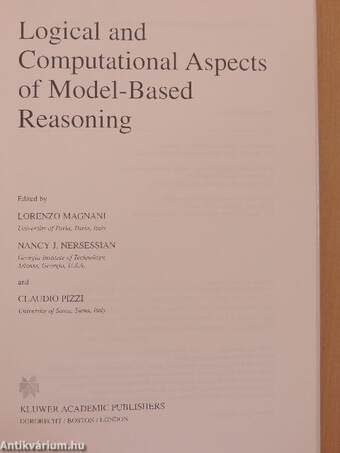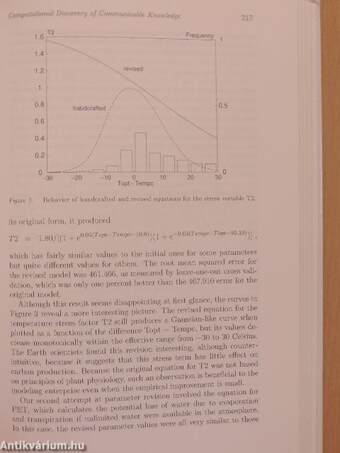1.119.458
kiadvánnyal nyújtjuk Magyarország legnagyobb antikvár könyv-kínálatát
Logical and Computational Aspects of Model-Based Reasoning
| Kiadó: | Kluwer Academic Publishers |
|---|---|
| Kiadás helye: | London |
| Kiadás éve: | |
| Kötés típusa: | Fűzött kemény papírkötés |
| Oldalszám: | 339 oldal |
| Sorozatcím: | Applied Logic Series |
| Kötetszám: | 25 |
| Nyelv: | Angol |
| Méret: | 25 cm x 16 cm |
| ISBN: | 1-4020-0712-4 |
| Megjegyzés: | Fekete-fehér ábrákkal illusztrálva. |
naponta értesítjük a beérkező friss
kiadványokról
naponta értesítjük a beérkező friss
kiadványokról
Fülszöveg
Logical and Computational Aspects of Model-Based Reasoning Lorenzo Magnani, Nancy J. Nersessian and Claudio Pizzi (Eds.) This volume is based on the papers that were presented at the International Conference ModelBased Reasoning: Scientific Discovery, Technological Innovation, Values (MBR'01), held at the Collegio Ghislieri, University of Pavia, Pavia, Italy, in May 2001. The previous volume ModelBased Reasoning in Scientific Discovery, edited by L. Magnani, N.J. Nersessian, and P. Thagard (Kluwer Academic/Plenum Publishers, New York, 1999; Chinese edition, China Science and Technology Press, Beijing, 2000), was based on the papers presented at the first "model-based reasoning" international conference. held at the same place in December 1998. The presentations given at the Conference explore how scientific thinking uses models and exploratory reasoning to produce creative changes in theories and concepts. Somé address the problem of model-based reasoning in ethics, especially... TovábbFülszöveg
Logical and Computational Aspects of Model-Based Reasoning Lorenzo Magnani, Nancy J. Nersessian and Claudio Pizzi (Eds.) This volume is based on the papers that were presented at the International Conference ModelBased Reasoning: Scientific Discovery, Technological Innovation, Values (MBR'01), held at the Collegio Ghislieri, University of Pavia, Pavia, Italy, in May 2001. The previous volume ModelBased Reasoning in Scientific Discovery, edited by L. Magnani, N.J. Nersessian, and P. Thagard (Kluwer Academic/Plenum Publishers, New York, 1999; Chinese edition, China Science and Technology Press, Beijing, 2000), was based on the papers presented at the first "model-based reasoning" international conference. held at the same place in December 1998. The presentations given at the Conference explore how scientific thinking uses models and exploratory reasoning to produce creative changes in theories and concepts. Somé address the problem of model-based reasoning in ethics, especially pertaining to science and technology, and stress somé aspects of model-based reasoning in technological innovation. The study of diagnostic. visual, spatial, analogical, and temporal reasoning has demonstrated that there are many ways of performing intelligent and creative reasoning that cannot be described with the help only of traditional notions of reasoning such as classical logic. Understanding the contribution of modeling practices to discovery and conceptual change in science requires expanding scientific reasoning to include complex forms of creative reasoning that are not always successful and can lead to incorrect solutions. The study of these heuristic ways of reasoning is situated at the crossroads of philosophy, artificial intelligence, cognitive psychology, and logic: that is, at the heart of cognitive science. There are several key ingredients common to the various forms of model-based reasoning. The term "model" comprises both internál and external representations. The models are intended as interpretations of target physical systems, processes, phenomena, or situations. The models are retrieved or constructed on the basis of potentially satisfying salient constraints of the target domain. Moreover, in the modeling process, various forms of abstraction are used. Evaluation and adaptation take place in light of structural, causal, and/or functional constraints, Modei simulation can be used to produce new states and enable evaluation of behaviors and other factors. The various contributions of the book are written by interdisciplinary researchers who are active in the area of creative reasoning in science and technology, and are logically and computationally oriented: the most recent results and achievements about the topics above are illustrated in detail in the papers. ISBN 1-4020-0712-4 VisszaTémakörök
- Idegennyelv > Idegennyelvű könyvek > Angol > Természettudományok > Matematika
- Idegennyelv > Idegennyelvű könyvek > Angol > Természettudományok > Egyéb
- Természettudomány > Matematika > Idegennyelvű
- Természettudomány > Matematika > Logika
- Természettudomány > Általános természettudomány > Kutatások, felfedezések
- Természettudomány > Általános természettudomány > Tanulmányok
- Természettudomány > Általános természettudomány > Tudomány
- Természettudomány > Általános természettudomány > Idegennyelvű > Angol
Megvásárolható példányok
Nincs megvásárolható példány
A könyv összes megrendelhető példánya elfogyott. Ha kívánja, előjegyezheti a könyvet, és amint a könyv egy újabb példánya elérhető lesz, értesítjük.


